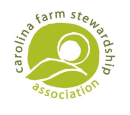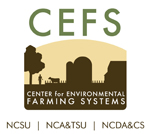Originally published 10/18/2010
One of the local CSA farmers, Elizabeth of Wild Onion Farms in Johnston County, NC sent out a message out today regarding the management of soil on a small sustainable farm and our need to eat what’s in season-greens.
As a graduate of Duke University, Elizabeth is always looking for innovative ways to save water & electricity. So this weekend she will be putting a new fan on her hoop house that is driven by a solar motor. This is a woman who had her house and belongings totally burn down a few weeks before Christmas last year along with all of her stored produce, seeds, tilling equipment and a favorite cat. In the spring, a fellow farmer offered her a free, well-used, hoop house. And not being one to waste an opportunity, Elizabeth managed to pretty quickly pull together a hoop house party and over the course of a couple of days with many volunteers we put up a funny looking hoop house (it used to be on a hillside). This weekend we will return to the farm to help out again and look forward to many delicious crops from Elizabeth as a result. http://www.wildonionfarms.com/index.html
Eat Your Greens!
We’re all in love with sweet, fruiting vegetables. Tomatoes, squash, peas, cucumbers, you name it. I’d grow little else but these, if I could, because they sell so well. But one small farm – and the seasons- have their limitations. These sorts of vegetables all fall within a few plant families, all take a lot out of the soil, and all tend to share the same insect and disease problems. This is a small farm, with only a little over 2 acres available for planting annual vegetables. In order to keep everything growing sustainably, I have to adhere to a pretty strict crop rotation. I could easily sell an acre of tomatoes every summer, but that won’t work in the long run without resorting to an arsenal of chemicals.
Most of the greens available now fall into the large, sprawling brassica family – mustards, etc. These plants are essential to the farm’s overall crop rotation because they tend to inhibit diseases that affect summer fruiting crops. Sure, I could skip the edible part, and just plant a mustard-y cover crop before next summer’s tomatoes. But if I’m going to plant, it may as well be edible, right? So if you want cucumbers and tomatoes next spring and summer, you need to eat your greens this fall and winter. Everything has it’s season!









